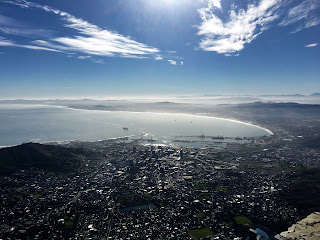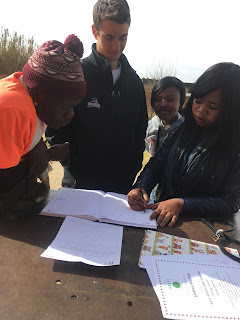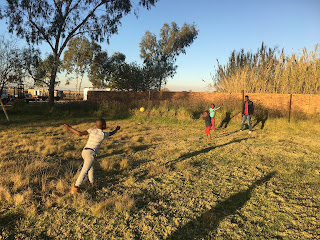My last day at the plot was the Thursday before I left South Africa and one day before I went on the Safari. I arrived at the plot excited to see the kids one last time before I headed home. I had told Br. Dominic and my friend David that Thursday would be my last day, and I was told that the workers and the children do a little goodbye celebration for visitors like myself. When I mentioned to a couple people that it was my last day, however, I quickly realized that the news did not make it to the workers beforehand. I felt bad because the workers were sad that they had not planned anything for me beforehand. I know they were looking forward to doing something for me on my last day. During the previous week, I made an iMovie slideshow to show the people at the plot the pictures and videos I had taken throughout my six weeks. At least I would have the video for all of us to celebrate with together. Anyways, the day went on, and the workers came back from lunch time before I knew it. I set up my slideshow in the dinning room on a projector that Radio Veritas let me borrow. We covered the windows with blankets and trash bags to make it darker. It was really nice. Everyone loved seeing themselves in the pictures and enjoyed the music that went along with it. As you know, they love to dance, so they appreciated that I included a couple videos from when I danced with them. I am so glad I was able to show them the slideshow.
After the slideshow, the day went on as usual. I served the kids lunch, cleaned up, and played soccer for a little while. Then, I was completely blown away to find out that the workers and many of the kids had quickly put together a farewell program for me while they were on their lunch break. I am still shocked at how last minute the celebration really was because it was more than I ever expected. Several groups of kids danced traditional Zulu dances and sang Zulu songs. Some of the kids and a couple of the workers spoke about why they enjoyed having me there and why they appreciated their time with me. On top of that, they made a poster for me and a bunch of handwritten farewell notes. I was completely blown away. I will never forget their kind hearts and incredible voices.
 |
| The Workers made a poster for me that says 'Farewell Jake' and a bunch of Zulu phrases around it such as 'we will miss you' |
 |
| Aunty Betty getting leading everyone in prayer with me for the last time |
 |
| These girls are holding signs that say things like 'we will miss you Jake' and 'thank you Jake' |
 |
| Of course another picture with Bro. Dominic |
 |
| Myself and some of the workers holding the poster they made for me |
Now, I will explain some things I learned about myself and about South Africa during my six weeks.
What surprised me about South Africa?
- How hard it was to get used to driving on the other side of the road
- None of the wild animals you hear about in Africa were roaming around the country accept in reserves like Kruger National Park
- The largest chain restaurants that the U.S. has in common are McDonald's and KFC
- The largest chain restaurants that the U.S. has in common are McDonald's and KFC
- The St. Martin de Porres project was not run as smoothly as I had anticipated it would. There are many issues with government oversight and communication within the organization. I am not sure why I expected the project to be so organized, but I did. So, I was shocked to find out that many of the workers at the plot may not be doing the best job or that the social workers may not be the most passionate about their jobs as I had expected. Working at the project was such an amazing experience for me, and I do not think it would have been so valuable if the project was perfect. I learned so much from Br. Dominic and my friend David about how to run a non-profit organization, how to pick my battles, and how to be an effective social worker
- The amount of trash everywhere. It was very disheartening for me to see an entire country neglect to recognize the harms that trash has on their environment. Every green space, from sidewalks to parks to soccer fields, had trash on it. I had many conversations with Br. Dominic about it over the course of my time there. I was angry at developed nations who allow their 'throw away' cultures to infiltrate the developed world without educating the population on how to manage and dispose of their waste. Br. Dominic was much harder on the African people, however, because he believed that it was their own fault. If they want their environment to look clean, then they should not litter, but rather wait to find a trash can. I came to the conclusion that it is a combination of our two sides that is the reason for all the trash and environmental neglect.
- How present the remains of Apartheid government still is in South Africa. It is shocking that African people of South Africa gained their freedom as recent as 1994. That is crazy to me. But, what is even more crazy is coming from the U.S. to South Africa and witnessing how the effects are still very present in their society. I am not talking about the whites being violent or indirectly racist towards the African people (although both are present issues), but I am talking about the actual mindsets of African people that really surprised me. In the U.S., people have had more than fifty years to understand the real possibilities that are available to all of us regardless of race. However, Africans in South Africa who are even twenty years of age and older do not yet believe that they have the ability to change their lives. Poverty is a vicious cycle and it is extremely difficult to break. I understand that. But, it can be done. Too many African people do not believe yet that they are actually equal to whites and that they are worth just as much. I was not expecting to witness this kind of thing in their society. I hope that I was able to influence a new perspective in the minds of the people I served.
What did I find interesting in South Africa?
- One of my favorite parts of the trip was just learning about the different ministries and things that the priests were up to at the house I was staying at. I really enjoyed living at the house with the Dominicans because it was quiet most of the time, but very lively around meal times and I always had different people to talk to because of varying schedules. As Dominicans, the Friars were in charge of completely different organizations. Some had their own parishes, some led organizations like St. Martins, and another managed a radio station. There were a few that I could not even keep up with because they did so many different projects and volunteered at so many different places. I fit in very well at the house because I am usually doing a million different things myself.
What did I learn about myself during my trip?
- I am very adaptable. When I was little, I used to get really homesick even during sleepovers for a single night. I was never able to go on vacation with other families or go to overnight camp because I missed home too much. Over the years, I became more and more comfortable being away from home. Adapting to college life was a huge step for me and I could not believe, and still cannot believe, how I managed to do it so well. I cannot imagine my college years anywhere else but Providence. Needless to say, I was pretty nervous for this trip to another country by myself. Once I got to South Africa, the only person in the entire continent I knew was Jen, whom I would not even see for the first four weeks. That's pretty scary. However, I completely surprised myself at how well I adapted to living in the priory, eating African food, working at the plot, and finding ways to occupy myself during down times.
- I am a quick learner when it comes to languages. I may not have left South Africa speaking perfect Zulu, but I was able to speak some of it and understand a lot of it. I also found that I am very good at picking up on conversational cues to understand what people are talking about even if I cannot understand the language. That helped me especially at the beginning of my trip.
- I mentioned before that I am not very good at picking my battles. I have struggled with that concept for a long time and my six weeks in South Africa were no exception. When you work in an non-profit organization like St. Martins and are constantly dealing with government back lash, employee drama, and slow moving progress, you need to learn to prioritize issues and recognize that not all of your challenges can be addressed at the same time. On top of that, you can never take your eye off the main goal of the organization while being distracted by all the side issues. For a huge part of my six weeks, the land we purchased next door had to be landscaped, a soccer tournament was being organized, a nearby organization needed financial help, St. Martins was looking into local fundraising opportunities, and several social workers were not pleasing Br. Dominic. All of these complex issues are too much for one person to take on, and they certainly cannot be taken on at the same time. I was frustrated because my mind was telling me that we would be failing if the issues were not taken care of right away. I had to recognize and understand that no one can work in an environment like that. All you can do is delegate and tackle each problem as they come or else you will run out of steam before you can even solve the first problem.
- I mentioned before that I am not very good at picking my battles. I have struggled with that concept for a long time and my six weeks in South Africa were no exception. When you work in an non-profit organization like St. Martins and are constantly dealing with government back lash, employee drama, and slow moving progress, you need to learn to prioritize issues and recognize that not all of your challenges can be addressed at the same time. On top of that, you can never take your eye off the main goal of the organization while being distracted by all the side issues. For a huge part of my six weeks, the land we purchased next door had to be landscaped, a soccer tournament was being organized, a nearby organization needed financial help, St. Martins was looking into local fundraising opportunities, and several social workers were not pleasing Br. Dominic. All of these complex issues are too much for one person to take on, and they certainly cannot be taken on at the same time. I was frustrated because my mind was telling me that we would be failing if the issues were not taken care of right away. I had to recognize and understand that no one can work in an environment like that. All you can do is delegate and tackle each problem as they come or else you will run out of steam before you can even solve the first problem.
What was the purpose of my trip?
- I think it is interesting to look back on my previous idea of what the purpose of the trip was and how that idea has changed or remained the same. I had written the fellowship proposals months before I left for South Africa. I had written about helping the St. Martin project in order to learn new perspectives about the world and share my perspectives from America. While that certainly turned out to be true, I also realized that a huge part of why I was sent there was to simply provide them, both the children and the adults, experience with someone of a different culture. Due to poverty and inadvertent segregation, the communities where I served do not have much experience with speaking with and befriending someone of a different race or nationality. As I said previously, the people in these communities also do not truly believe that they are equal to whites. It was important for me to go to their homes, their restaurants, and their neighborhoods to more deeply understand what it means to live their lives. In doing so, I also showed the people in these communities that they are not only noticed in society but actually valued. For some of the people I spoke to, that feeling of being a dignified human does not come often enough. No one should ever feel as if they are invisible.
- To learn about a completely new culture
- To learn how to communicate with those of another culture and language
- To grow in my faith and to see the Church in a new way
- To become more knowledgeable and appreciative of the Dominican Order
- To see my strengths and weaknesses be revealed as I adapted to a completely new environment
JW
- I think it is interesting to look back on my previous idea of what the purpose of the trip was and how that idea has changed or remained the same. I had written the fellowship proposals months before I left for South Africa. I had written about helping the St. Martin project in order to learn new perspectives about the world and share my perspectives from America. While that certainly turned out to be true, I also realized that a huge part of why I was sent there was to simply provide them, both the children and the adults, experience with someone of a different culture. Due to poverty and inadvertent segregation, the communities where I served do not have much experience with speaking with and befriending someone of a different race or nationality. As I said previously, the people in these communities also do not truly believe that they are equal to whites. It was important for me to go to their homes, their restaurants, and their neighborhoods to more deeply understand what it means to live their lives. In doing so, I also showed the people in these communities that they are not only noticed in society but actually valued. For some of the people I spoke to, that feeling of being a dignified human does not come often enough. No one should ever feel as if they are invisible.
- To learn about a completely new culture
- To learn how to communicate with those of another culture and language
- To grow in my faith and to see the Church in a new way
- To become more knowledgeable and appreciative of the Dominican Order
- To see my strengths and weaknesses be revealed as I adapted to a completely new environment
 |
| One last look at that good old South African sunset |
 |
| Me and Jen at the airport in Boston (hers says 'Jane' because that is how everyone pronounced her name in South Africa) |
JW























































